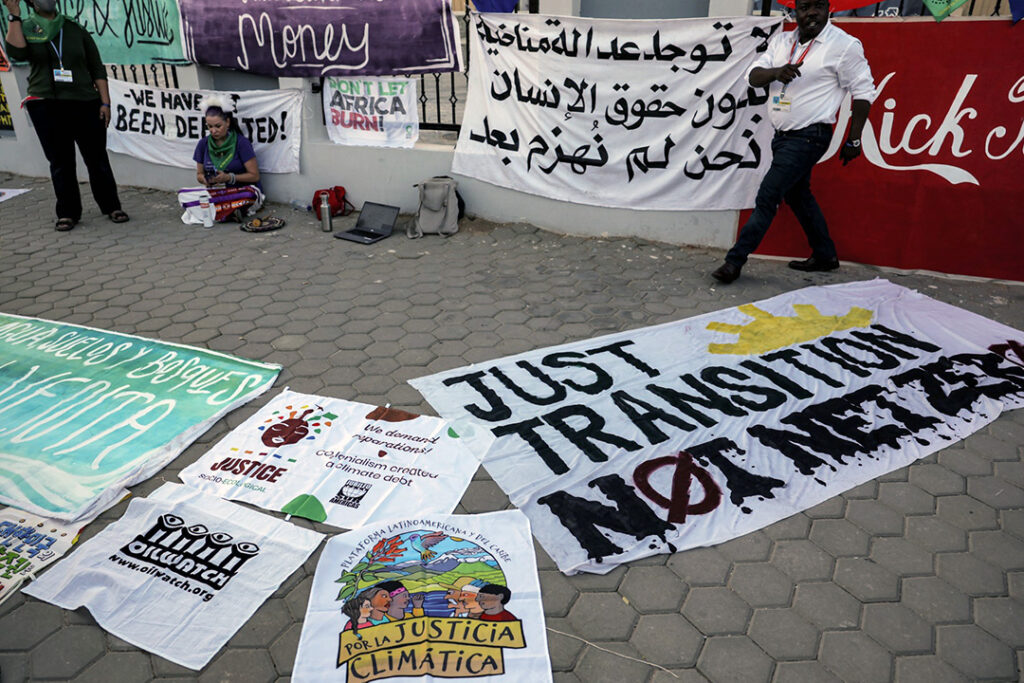Africa is emerging as a theatre of competition for global powers and there are significant opportunities on offer for savvy African states to exploit – most notably in the energy arena.
Indeed, as the concept of “friendshoring” (manufacturing and sourcing from countries that are geopolitical allies) becomes more popular in the wake of the pandemic and Ukraine war, countries that position themselves strategically can capitalise on increased investment flows and strategic support. Although this trend is still in its nascent stages, there is room for optimism as both the modes and universe of potential investment expand for African countries.
It is no secret that the onset of the Russia-Ukraine war has triggered a severe energy crisis in Europe. And despite battling the immediate contagion of food and fuel prices, the fallout from the crisis may spark a renaissance for African energy producers as Europe turns to Africa to bridge the gap. If the continent’s leaders play their cards right, Africa’s impossible climate challenge could turn into an opportunity.
The most obvious area where this is likely to play out is in critical metals and minerals for the clean energy transition, which presents an opportunity for many African countries to bypass traditional fuels and infrastructure and go straight to building sustainable energy systems. The global ambition to reach net-zero greenhouse emissions has charted a new course for the global energy sector, leading to declining clean technology costs and shifting global investment patterns. Along with the high price of oil and gas, this is presenting opportunities for African countries that produce the critical minerals needed for these low-carbon technologies.
Against this backdrop, where are the opportunities and who are the potential winners?
In southern Africa, Namibia is well on its way to becoming a green hydrogen economy, mainly due to the take-off of several major projects. These include the 3GW Tsau Khaeb project developed by Hyphen Hydrogen Energy, with a production capacity of 300,000 tons per annum (tpa) at a cost of $9.4 billion, as well as the 2.5GW Tumoneni project; the 42MW Daures Green Hydrogen Village project; and the 50MW Swakopmund project.
The country is also targeting the development of three hydrogen valleys in Kharas, Walvis Bay Port and Kunene. Estimates suggest that Namibian hydrogen could eventually be the cheapest in the world, with costs falling to around €1.50–2.00 per kilogram.
Mauritania, meanwhile, is home to the continent’s biggest green hydrogen development. The existing infrastructure such as the deep-water port of Nouadhibou, as well as its location relatively close to European markets, is making it another highly attractive green hydrogen market.
The Democratic Republic of Congo is fast emerging as a key player given its comparative advantages in this space. With approximately 70% of the world’s cobalt reserves, vast copper and coltan reserves, and large (mostly untapped) lithium deposits, the country is a critical cog in the future development of new-generation technologies, including electric vehicle (EV) batteries. As a result, Kinshasa is being aggressively courted by Washington and Beijing and a host of other powers.
Then there are much-vaunted Just Energy Transition Partnerships, which offer opportunities for countries to leapfrog from coal to clean energy. These JETPs are nascent financing cooperation mechanisms that aim to support these countries’ self-defined pathways as they move away from coal production and consumption while doing so in a way that addresses the social consequences involved.
The first such JETP emerged from COP 26 in Glasgow in 2021, when South Africa was promised $8.5 billion in financing by France, Germany, the United Kingdom, the United States, and the European Union (EU). Although implementation has thus far left a lot to be desired (the project has faced political turbulence, critical personnel changes, mismanagement, and corruption), the partnership offers a clearly defined template on how to structure win-win partnerships between developed and developing countries and the private and public sectors.
These investments are not just limited to clean energies. The EU’s decision in July 2022 to define natural gas and nuclear power as “green” or “sustainable” sources of energy courted allegations of hypocrisy and double standards, but African gas producers are sensing commercial opportunities.
In this context, the Trans-Saharan Gas Pipeline (TSGP) – a trilateral project between Nigeria, Niger, and Algeria with a decades-long history -has seen a fresh attempt at a revival. Last July, the energy ministers of the three countries signed a memorandum of understanding and agreed to set up a task force for the project, to update an existing feasibility study. Although the idea to pipe gas across the Sahara to Europe was first mooted more than 40 years ago, recent events have created a new wave of momentum.
Additionally, Nigeria and Morocco have signed an agreement that inches a long-standing proposal for a gas pipeline between the two countries closer to reality, raising the possibility of a new energy supply route for West Africa and Europe. The pipeline will run along the West African coast from Nigeria, through Benin, Togo, Ghana, Côte d’Ivoire, Liberia, Sierra Leone, Guinea, Guinea Bissau, Gambia, Senegal, and Mauritania up to Morocco. Nigeria, in particular, is hoping to monetise its vast gas reserves by selling to Europe, which imported 155 billion cubic metres of Russian gas in 2021. Nigeria has 7.4 trillion cubic metres of gas in reserves.
The gas prospects have been further catalysed by the ongoing diplomatic friction between regional rivals Morocco and Algeria, which has spurred competition between the two nations to complete these megaprojects and provide new energy routes to Europe.
Lastly, with more than 100 trillion cubic feet of natural gas reserves, Mozambique has become one of the most attractive gas plays worldwide. While several challenges have caused delays in project development, the country celebrated the export of its first-ever Liquefied Natural Gas (LNG) shipment last November.
However, the optimism about Africa’s energy is not shared universally. While “greenwishing” sounds exciting, many states still face electricity deficits, economies are reliant on fossil fuels, and financing shortfalls and political resistance remain in play.
To be sure, the African continent faces a unique trilemma of how to balance the energy access required for development with climate mitigation and the inevitable impacts. To do this successfully, Africa’s private and public sector players must navigate significant trade-offs, including balancing short- and long-term considerations, the risks and rewards and the potential of clean energy, with the pitfalls of energy poverty.
More specifically, African policymakers will need to resolve three key conundrums to capitalise on these windfalls.
First is the dilemma between financing and fairness. Whilst cash-strapped African sovereigns are desperate to export gas to boost their finances, large swathes of their populations lack access to electricity and governments will face domestic pressure to prioritise universal access. Moreover, there is a strong sentiment in many parts of the continent that Africa cannot serve as the sacrificial lamb for the West’s excesses, especially in the context of high debt burdens and unsustainable debt servicing costs.
This is best encapsulated by Mia Mottley, the prime minister of Barbados and architect of the Bridgetown initiative, who argues that: “Developing countries are facing debt overhangs, higher borrowing costs and limited access to liquidity in times of crisis. In turn, developing economies cannot fund progress on the Sustainable Development Goals (SDGs), including climate adaptation, if they are borrowing at up to 14% while also paying more than 20% of revenue for debt servicing.”
The second is the dilemma between security and investment. This is a chicken and egg situation – in many instances, socioeconomic grievances and a lack of opportunities lie at the heart of insecurity in many countries and catalysing investment is a critical ingredient in improving these situations.
However, patient capital requires a safe and predictable environment to invest in, something that is often lacking in resource-rich jurisdictions. A lack of investment threatens to perpetuate a cycle of violence, yet major energy companies will be reluctant to deploy capital into regions where there are risks of militancy. Nowhere is this more apparent than in Mozambique’s Cabo Delgado province. Since the discovery of oil and gas, around 4,000 people have been killed and close to a million displaced in the province by Islamic extremists. The insecurity forced French energy giant Total to declare force majeure in April 2021, after Islamic State-linked rebels raided a nearby town, killing dozens of people.
Third is the tension between domestic sovereignty and climate colonialism. Simply put, climate colonialism refers to the exploitation of Global South resources by Global North nations for their green agendas. With a contribution of only 3% to global carbon dioxide emissions since the beginning of industrialisation in the 18th century, Africa has been unable to benefit from the fossil-fuelled industrial development that made the Global North rich. Furthermore, with more than 400 million people in Africa living on less than $2 per day, their needs are too great to be met solely with current green energy.
Consequently, sceptics argue the Global North is now attempting to outsource its carbon footprint via the relocation of dirty industries and is looking to exploit Africa’s resources for its own agenda. This, in turn, is creating political pressure on Africa’s leaders to resist any efforts that may compromise the continent’s industrialisation. The West’s perceived climate hypocrisy, and the potential for greater resource nationalism across Africa, means policymakers need to skilfully balance these considerations.
But perhaps the most crucial factor of all is political will.
African leaders will need to demonstrate strategic leadership, adhere to sound governance guidelines, and pursue balanced regulatory regimes to reap the dividends of this new wave of interest and investment. There are growing fears that current dynamics may lead to a new resource curse and that the potential benefits are squandered. Safeguarding this through robust institutional mechanisms will be essential to ensuring sustainable gains. For African governments, enabling commercial environments and working in partnership with private sector investors and international partners could catalyse a virtuous cycle of growth – attracting revenues to boost government coffers, creating jobs locally, reducing poverty rates, and supporting domestic development goals.
There is a compelling opportunity for African states to shift growth in a green direction. But this should happen on its own terms, not those of external parties.

RONAK GOPALDAS is a director at Signal Risk, an exclusively African risk advisory firm. He was previously the head of country risk at Rand Merchant Bank (RMB) for a number of years, where he managed a team who provided the firm with in-depth analysis of economic, political, security and operational dynamics across sub-Saharan Africa. He holds a BCom degree in philosophy, politics and economics (PPE) and a BCom (Hons) from the University of Cape Town (UCT). He also has an MSc in finance (economic policy) through the School of Oriental and African Studies (SOAS) in London.[



